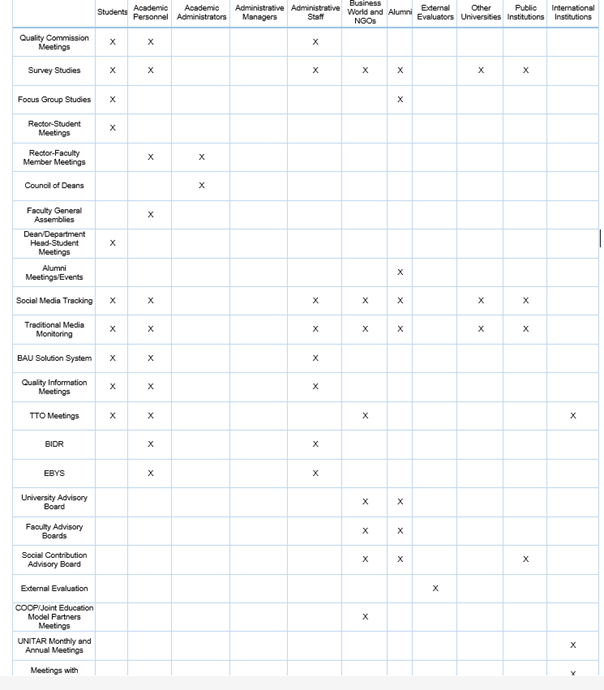Purpose and Scope
Bahçeşehir University (BAU) is committed to fostering sustainable, transparent, and mutually beneficial relationships with all its stakeholders. This policy defines the guiding principles and practices that govern the University’s engagement with its internal and external stakeholders, ensuring their meaningful participation in institutional decision-making processes.
The policy applies to all individuals, groups, and organizations that interact with, influence, or are affected by the University’s academic, administrative, social, and community-oriented activities.
Internal Stakeholders
Students:
As the central focus of all University activities, students are regarded as key stakeholders. Their academic, social, and personal development guide institutional strategies and policies. Student opinions are systematically gathered and incorporated into decision-making processes, reflecting BAU’s student-centered governance model.
Academic Staff (Faculty Members):
Professors, lecturers, and researchers play a vital role in fulfilling the University’s academic mission. Faculty members actively contribute to the design of curricula, development of research initiatives, and formulation of institutional policies.
Administrative Staff:
The University’s administrative and professional staff ensure the effective and efficient operation of all services. Their experience and insights are integral to shaping administrative processes, improving service quality, and enhancing stakeholder satisfaction.
External Stakeholders
Alumni:
Graduates of Bahçeşehir University are lifelong members of the BAU community. They contribute to institutional development through mentorship, collaboration in research and innovation projects, and active participation in alumni networks.
Families of Students:
Families are valued partners in the educational journey of students. Their feedback is considered in matters concerning student well-being, accommodation, and financial support, ensuring that the University’s services align with students’ holistic needs.
Business and Industry Partners:
BAU collaborates closely with industry stakeholders to promote applied research, internships, entrepreneurship, and employment opportunities. This partnership ensures that academic programs remain responsive to current market demands and future industry trends.
Public Institutions and Government Bodies:
The University maintains strong ties with national and local government agencies, contributing to public policy, research collaborations, and national development initiatives. These partnerships support compliance with education standards and the advancement of Türkiye’s innovation agenda.
Non-Governmental Organizations (NGOs) and Civil Society:
BAU actively engages with NGOs and civil society organizations to promote social responsibility, sustainability, and community engagement. These partnerships amplify the University’s impact on issues such as equality, inclusion, and environmental stewardship.
Local Communities:
Communities surrounding BAU campuses are important stakeholders who benefit from the University’s cultural, social, and economic contributions. The University works collaboratively with local organizations and residents on initiatives that promote urban and regional development.
International Partners:
As part of its global mission, BAU maintains partnerships with international universities, research institutions, and global organizations. These collaborations expand opportunities for student mobility, joint research, and cross-border innovation.
Media:
The media serves as a strategic communication partner, enabling transparent dissemination of information about the University’s achievements, research, and societal contributions. BAU prioritizes proactive and accurate communication to maintain public trust and engagement.
Accreditation Bodies and Professional Associations:
BAU works in close alignment with accreditation agencies and professional associations to ensure that all programs meet national and international quality standards, supporting the University’s commitment to excellence and accountability.
Suppliers and Contractors:
Suppliers and service providers are essential contributors to the University’s operational sustainability. BAU ensures that all partnerships are governed by principles of ethical conduct, transparency, and environmental responsibility.
Core Principles
Transparency and Open Communication:
BAU prioritizes clarity, honesty, and accessibility in all stakeholder communications, ensuring mutual understanding and accountability.
Mutual Trust and Respect:
All stakeholder relationships are grounded in trust and respect, recognizing the value of diverse opinions and perspectives in shaping the University’s direction.
Participatory Governance:
BAU encourages the active participation of stakeholders in governance and decision-making processes through consultations, advisory committees, and collaborative platforms.
Continuous Improvement:
Stakeholder relations are regularly evaluated and enhanced based on feedback, ensuring adaptability to evolving expectations and institutional goals.
Diversity and Inclusion:
BAU embraces cultural, disciplinary, and intellectual diversity as a source of strength. The University is committed to inclusive engagement that values every voice and fosters equal participation.
Responsible Stakeholder Management:
The University safeguards the rights and interests of all stakeholders and ensures fair and balanced resolution of potential conflicts of interest.
Social Responsibility and Community Impact:
In line with its founding mission, BAU prioritizes societal contribution through education, innovation, and outreach. The University collaborates with stakeholders on initiatives that promote social justice, sustainability, and the common good.
Stakeholder Engagement Mechanisms
Feedback and Surveys:
Regular stakeholder surveys and feedback mechanisms are conducted to assess satisfaction, identify areas for improvement, and inform strategic decision-making.
Workshops and Consultative Meetings:
The University organizes thematic workshops, roundtables, and dialogue sessions that enable stakeholders to exchange ideas and contribute to institutional development.
Collaborative Projects and Partnerships:
BAU engages in joint initiatives with industry, government, and civil society actors to co-create solutions that address shared challenges and advance sustainable development.
Stakeholder Representation:
Stakeholders are formally represented in various University boards and committees, ensuring that their perspectives are integrated into governance and policy formulation.
Audits and Continuous Development:
This policy is periodically reviewed and updated to maintain relevance, alignment with institutional strategy, and responsiveness to stakeholder expectations.
Conclusion
Bahçeşehir University regards stakeholder engagement as a strategic cornerstone of its governance and sustainability model. Through transparent communication, participatory structures, and collaborative partnerships, BAU ensures that all stakeholders—internal and external—are empowered to contribute meaningfully to the University’s mission, vision, and long-term development.
Created: 2021
Reviewed: 2024
The images below present Bahcesehir University’s stakeholder analysis, defining how different internal and external stakeholders are engaged in and contribute to the university’s governance and decision-making processes.
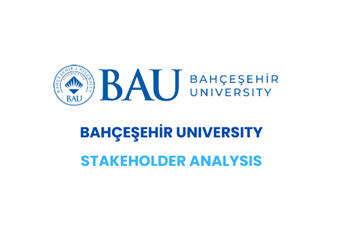
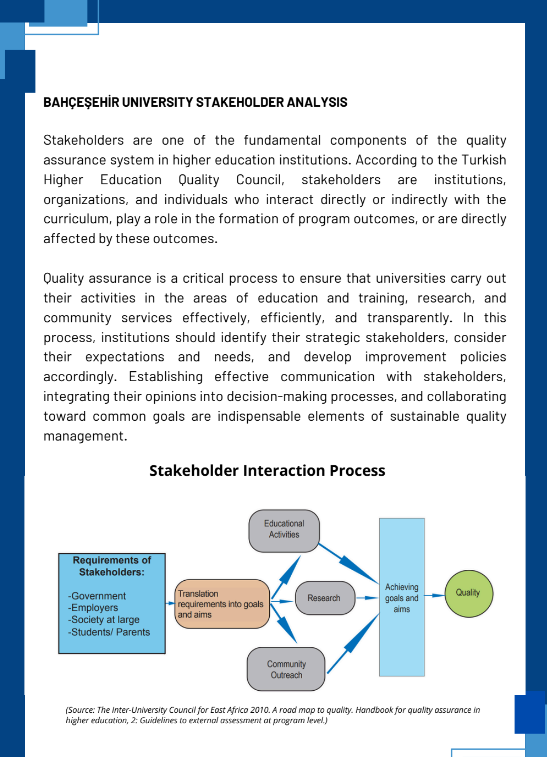
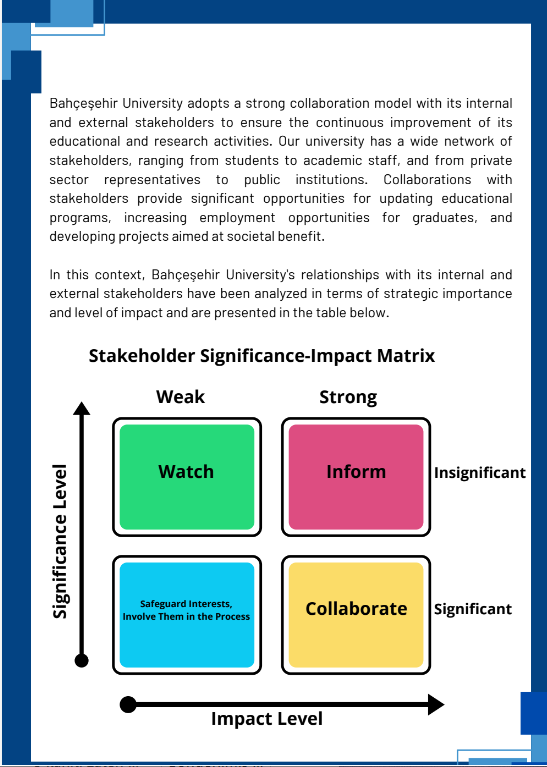
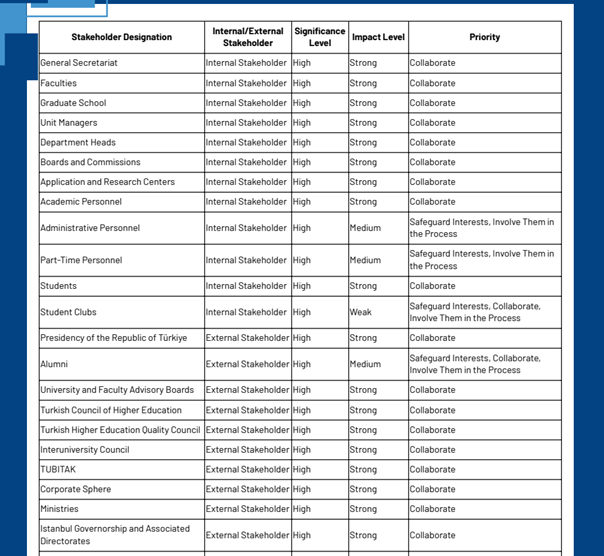
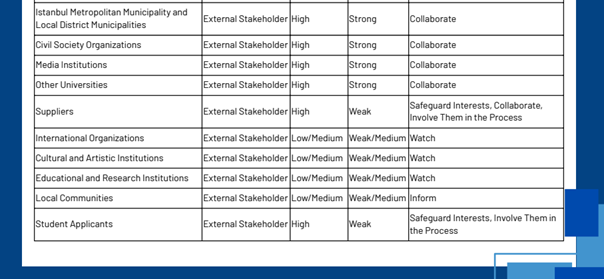
3- BAU Stakeholder Engagement Mechanism
